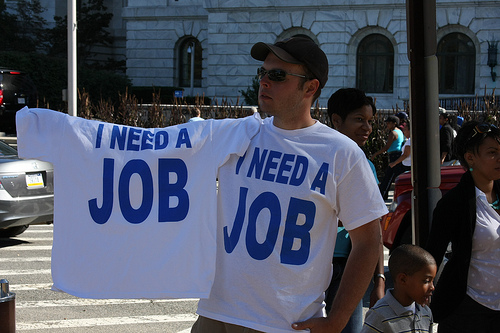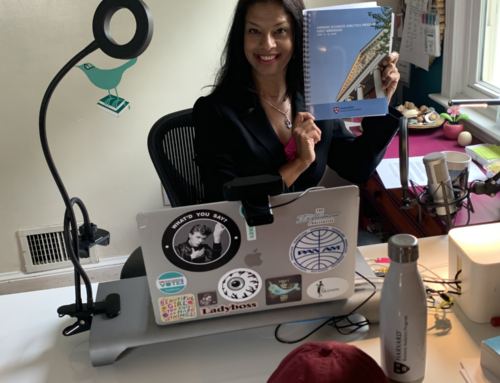 Are you planning to add job seeking to your list of New Year’s resolutions?
Are you planning to add job seeking to your list of New Year’s resolutions?
I’ve been both sides of the interview table quite a bit.
But probably the time that I did the most interviewing was at my last job.
I was trying to build up a really well-rounded in-house communication team encompassing a range of communication disciplines, both internal and external.
Since said “last job” was for the oldest animal welfare organization in the United States, you’ll understand that we were rarely short of applicants.
Image: Tania Gail via Flickr, Creative Commons
We were deluged by applications; when we had openings, when we didn’t have openings, when we had budget to hire, when we didn’t have budget. It was crazy.
As a result, I learned a few things both about hiring as well as job seeking, that have stayed with me to this day.
Here they are. I hope they are helpful.
1. Don’t try to circumvent HR.
I know that HR, like recruiters, can be the bane of the job seeker’s life (I’ve dealt with some HR professionals over the course of my career I’d be quite pleased never to hear from again).
But the ones who are good, are really really good.
Despite the fact that the application process was clearly outlined on our website (and anywhere else the job descriptions were posted), I can’t tell you how many emails and resumes I received directly from applicants.
Guess what happened to ’em? They got forwarded to HR.
Even the resumes I received from people “who knew someone who knew someone” went to HR.
There is a reason organizations have a hiring process, and it’s usually to make it as efficient as possible. Not to mention the fact that there are certain technicalities about hiring that the VP of a department is not going to be aware of… because that’s not our job.
And it’s HR’s job to help the VP navigate those waters.
So if you’re interested in a job, the first step is to apply following the organization’s process. It shows that you respect the organization’s systems, which is something you’re going to have to be able to live with and adhere to if you get that job.
If you are trying to get an edge and have figured out a connection to the manager of the department in which you hope to work, certainly see if someone can put a word in for you.
But remember that that doesn’t necessarily mean you’re going to skip to the head of the line.
2. Walk the talk.
 One of the most creative cover letters I received was one sentence; 14 words, to be exact.
One of the most creative cover letters I received was one sentence; 14 words, to be exact.
I kid you not. It was so creative, that I remember it verbatim to this day.
It read:
“I don’t just think out of the box, I set the box on fire.”
Image: Jimmy Cardosi via Flickr, Creative Commons
Can you imagine my face when I saw that? Despite the fact that this person had ignored #1 above, I couldn’t help but be intrigued by someone who had the gumption to write that.
Nothing about skills, work history, or being a fit for the organization, which is what you’d expect to see in a cover letter.
But sass, chutzpah and gumption? Those 14 words clearly had ’em.
So I forwarded the application to HR and, in due time, we called this person in for an interview.
What a disappointment. A very charming person, but one whose creativity didn’t extend to understanding – or explaining – how exactly that creativity would be applied to the job at hand.
Creativity will only get you so far. After that, you have to show you can actually do the job.
Which brings me to my next point.
3. Passion is not the primary factor in making a hiring decision.
If there was a recurring theme among every single person seeking jobs in our department, which was called “Media & Communications,” it was “passion.”
“I love dogs!”
“I have <insert number> rescue(d) cats!”
“Saving animals is my passion!”
The little voice inside me invariably chimed in, “If saving animals is your passion, you’re better off applying to work in one of the departments that works directly with animals, rather than the PR department.”
(No. Of course I didn’t say that out loud. What do you think I am, rude or something?)
Obviously we weren’t going to hire anyone who came up to us and told us they hated animals or would do unmentionable things to them.
But the direct act of saving animals wasn’t our department’s function.
What we did was provide communication support services to help tell the stories of the organization and its many departments, to raise awareness among our stakeholders, and to foster better relationships with those stakeholders that would, in turn, support the organization’s goals and objectives.
Don’t get me wrong; passion is lovely. But don’t confuse passion for the core service of an organization with the experience and skills to do the job at hand.
In my opinion, passion – as the primary qualification for employment – is often overrated.
 4. Your qualifications really do need to match the job description.
4. Your qualifications really do need to match the job description.
I can’t tell you how many applications we received from people who were clearly over-qualified for the positions they were applying for.
Or how many applications we received from people who were clearly under-qualified for them. Or not qualified at all (see #3 above).
Most of the time – actually, all the time – these applicants were seeking their “dream job.”
Image: Christine Ward via Flickr, Creative Commons
The over-qualified candidates were usually willing to take pay cuts in order to get their foot in the door. That’s not unusual.
But nine times out of 10, what came across was that they weren’t interested in that specific job so much as just getting their foot in the door.
The under-qualified applicants believed they could make up for that lack with passion. See #3 above. Again.
If we came across someone who was partially qualified, really bright and who we thought could learn the ropes, you bet we tried to give them a shot.
But this was based on them having at least some relevant qualifications and/or experience.
And it was very sad to have to hear the over-qualified applicants try desperately to explain why it didn’t matter they were over-qualified while we knew – from their expressions and body language, though sometimes they were honest to come right out and say so – that it just wouldn’t work.
So think long and hard before pursuing a job that is clearly not a match, whether you’re over- or under-qualified for it. It really doesn’t work in the long run.
5. Don’t piss the hiring manager off.
This seems like a no-brainer, but you’d be amazed at how many candidates I interviewed who apparently couldn’t care less about making a good first impression.
They were so full of themselves, that they started telling me how to do my job.
Never mind the fact that a) it wasn’t the job they were interviewing for (hello!), or b) that if I wasn’t going to be supervising them directly, I’d certainly be managing them indirectly.
It’s quite possible that
you’re smarter than the person you’re being interviewed by;
you’re smarter than a lot of people you might be working with;
and you could, once in, leave everyone else in the dust and rise to the top, no matter how Machiavellian your methods.
But it’s also quite possible that you won’t have a chance to do that… because you were trying so hard to impress the hiring manager, you forgot to be polite… or kept interrupting… or showed impatience at the number of people you’d have to meet…
… or did any number of other silly things.
Of course we all want to be thought of as smart people, and we want to hire smart people.
But we’re not going to hire people whose smartness seems to border on arrogance.
I know it’s tough; you’re so full of nervous energy when you’re in the interview seat that sometimes it comes across the wrong way.
So what I’d suggest is that you practice practice practice being interviewed. Do your homework on the organization, and then grab a friend whose opinion you trust to role play the interviewer.
The more you are put through your paces, the more comfortable you will be leading up to, and during, the interview. And that will help you put your best job-hunting foot forward, without irritating anyone.
Was this helpful?
But wait, there’s more!
If you’re in job-hunting mode, make sure you sign on to the December 8 HAPPO Twitter chat from 9-10 pm ET (remember to use the #happo hashtag to follow and participate in the chat). That’s where I and several other HAPPO champs will do our best to share helpful advice (and maybe some laughs) to fine tune your New Year’s resolutions for job-seeking.
More resources for you:
- Gini Dietrich gives you 8 ways to avoid making a bad first impression over at Spin Sucks
- Narciso Tovar‘s guest post on real character, real work
- Job-hunting long distance? Five do’s and don’ts to jumpstart your search (yup, more from me)


![[EVENT]: PR Hacks for Small Biz (online)](https://shonaliburke.com/wp-content/uploads/2021/06/FB-Ad-1200x800-01-01-01-Copy-500x383.jpeg)






[…] For an event which also includes a résumé review/counseling component, though, it’s a good idea if the venue is set up not just with a (cash) bar and appetizers, but with tables and chairs so that people can sit down and focus on the job at hand. […]
[…] check out my earlier post on New Year’s resolutions for job seekers, as well as the networking category on WUL for more tips and (I hope) helpful […]
[…] check out my earlier post on New Year’s resolutions for job seekers, as well as the networking category on WUL for more tips and (I hope) helpful posts. Thanks so […]
Shonali
What an interesting read. I’ve never been on the other side of a hiring situation, so it’s very interesting to read your experiences. When I got my main job (braille transcriber at a blindness institute), I had NO qualifications, didn’t know Braille, was just out of uni with a degree in Archaeology, of all things. My boss said I got the job over another lady who had around 5 years experience, because she could see my enthusiasm. I LOVE my job and try and spend every day making sure she doesn’t regret her decision.
I think you’re right though, that passion isn’t everything. I think, in my case, they saw someone VERY young with a mature attitude walking through the door, and realised I was the next generation of accessible format producers, which they don’t have (everyone I work with is 20 years older than me). I think that might have played a large part in their decision.
That cover letter took some serious guts. You’d have to really live up to that first impression to get the job!
Steff, I’m absolutely fascinated by your story and blog. Thank you so much for stopping by and sharing some of your experiences.
Yes, that cover letter was something else…!
[…] New Year’s Resolutions for Job Seekers | Waxing UnLyrical […]
Great post! Too few job seekers (and also far too few hiring managers) get this.
On the ‘go through HR’ issue: I think it is wise to follow any organization’s process – usually an online app that goes through HR. BUT as a long-time HR person, I also know that our systems are not always as good as we want and some HR folks are not either. So, it is always, always, always smart to network your way in – make a connection and ask that connection to refer you to the right people. Employee referrals are a prime way of hiring for many organizations.
I LOVE when you stop by WUL, Patra! Completely agree on the networking comment, my point was more to make sure applicants don’t come across as trying to strong-arm their way in, because that can leave a bad taste in one’s mouth.
Shonali, good post and glad to see you included Gini’s 8 Interviewing tips. I must agree with Jen’s comments.
#1 We preach connections and relationships in social media, so it is very much about “who you know.” Much of the job market is hidden, sometimes even unknown to HR. I’m not advocating sidestepping proper channels, just saying: network, Network, NETWORK.
#2 and #4 ITA with walking the talk, being yourself and representing your talents and skills accurately. While the “creative” cover letter may open a few eyes, it’s a risk. You gotta nail it and even then, mileage will vary greatly. Doesn’t mean you can’t show some style and personality, but the example you gave me just seemed too hyped, arrogant and well, business barf hyperbole.
#5 Being smarter. Sigh.. you don’t want to piss anyone off and yes, lots of people didn’t like the smartest kid in the class. Or the person across the desk may be smarter, like you said. Not to get too Machiavellian myself but something else to keep in mind: the person across from you may only be one or two rungs up the ladder and could be threatened by someone supper smart and capable of replacing them someday. FWIW.
Davina – yes, completely agree with the network network network philosophy. My point was more to remind those who are so determined to get in that they ignore that they still have to go through the “usual channels,” if nothing else, to be able to say, “I did apply, but wonder if HR saw it…?”
Re: “business barf hyperbole” – I LOVE that term!
Re: #5 – very true. I personally think it’s great to hire uber-smart people who could some day take your place, after all, isn’t that what growth is all about? But yes, there is always the possibility that the interviewer may him/herself be in a precarious position (interviewees are rarely privy to the inner politics of an organization when they are on the outside, in my experience), and those dynamics, though hidden, invariably color the interview. Therefore, even more of a good idea to be circumspect in the initial stages. Isn’t there a saying, discretion is the better part of valor?
Better part of valor for sure, don’t over reach OR sell yourself short. Oh and two of my fave Twitters are @BusinessBarf and @Unsuckit, with a whole list of terrible jargon. Hilarious, one of my faves is still Wow Factor: http://unsuck-it.com/wow-factor/ ;-)
[…] This post was mentioned on Twitter by Shonali Burke and Jen Zingsheim, Beth Barnard. Beth Barnard said: Thank you! RT @jenzings For a discussion on cover ltrs, check out @shonali 's recent post on Waxing UnLyrical http://bit.ly/gkalNk :-) […]
That cover letter is really funny! I might try it sometime…thanks for the advice…haha ;)
Rachael, my $0.02 – do not get that creative…!
Hello Shonali! Interesting post, and while I don’t disagree completely, my experience has been somewhat different. It’s a matter of degrees I think–my thoughts:
On point #1: I’d agree in part that people should expect HR will need to be in the process. But I’ve seen people submit through the online systems and get nowhere–not even a response–but give the resume to someone trusted within, and all the sudden they get a call and an interview (and, in a couple of cases, hired). So often it’s a “who do you know” situation–and this makes sense. When another person within a company will vouch for a candidate, it reduces some of the risk of an unknown hire.
On cover letters: A cover letter that “creative” is taking a big risk. Where you saw chutzpah, I rolled my eyes. A one-sentence cover letter wouldn’t get anywhere with me, as I use cover letters as a tool to determine if the person can write, pays attention to punctuation and grammar, etc. I’m impressed you called the person in, but not surprised they didn’t fit the bill.
On passion: it might not be a primary factor, but it does have a place, particularly in the non-profit realm. Believing that you are contributing to a cause larger than yourself can contribute to job satisfaction, even at lower pay or with long, punishing hours. I speak from experience here. My time in politics had low pay with brutal hours. If I hadn’t believed in what I was doing, with passion, I wouldn’t have lasted long. Burnout is a real issue, and passion can mitigate that. This isn’t in contradiction to what you said, I don’t think, but is worth noting.
On over-qualification: for the most part, I agree. But sometimes there is a reason for a desire to make a lateral move, or even a step down. I’d take each on a case-by-case basis.
Sorry for the long comment! Lots of discussion points there. I think this speaks to a final point, of which all job seekers should be aware: the hiring process is a far more subjective process than anyone likes to think.
Jen, I love the long comment, please don’t apologize for it!
I agree with you about the online systems often missing qualified candidates, and @chillygal pointed out the same thing on Twitter. My point was more to not expect to circumvent HR completely simply because one might have or find a contact within the organization. I completely agree that “who you know” is a huge factor in successful job-hunting; I think it’s a huge factor no matter what we do, quite frankly. But it’s not going to be the only factor, and I was writing from the point of view of my experience(s) where people expected to automatically get called for an interview because of who they knew and ignored the “official” process completely. While that may have helped move their resume up, I’ve also seen it backfire, where the people on the other side of the table felt they were being strong-armed into hiring someone and it didn’t work out.
Re: the cover letter – COMPLETELY agree with you that a letter that is “creative” to this extent is a huge risk, and it’s never something I would advocate. This person certainly intrigued us enough that we called her in, as I related, and maybe part of why we were so disappointed was that we had high hopes based on that sentence, and the accompanying resume was certainly very decent too. Sigh.
Re: passion – yes, again, I agree it can make a huge difference and often helps to keep one going when other factors in the work environment are less than optimal. I saw too many applicants – especially at the A – who assumed that their passion would make up for their lack of competence in the area they would actually have to work in. During my time there, I don’t think we hired anyone (for my department) who came from an animal welfare background; they may have been animal lovers (as you and I are) but they had core competencies in the areas we were looking to fill.
I think you’re absolutely right about the fact that the hiring process is very subjective. At the end of the day, one could have 3 equally qualified candidates, but chances are one will go with the candidate with one whom has the best vibe, because they are who you’re going to have to work with.
Thanks so much for taking the time to share such a thoughtful reply!